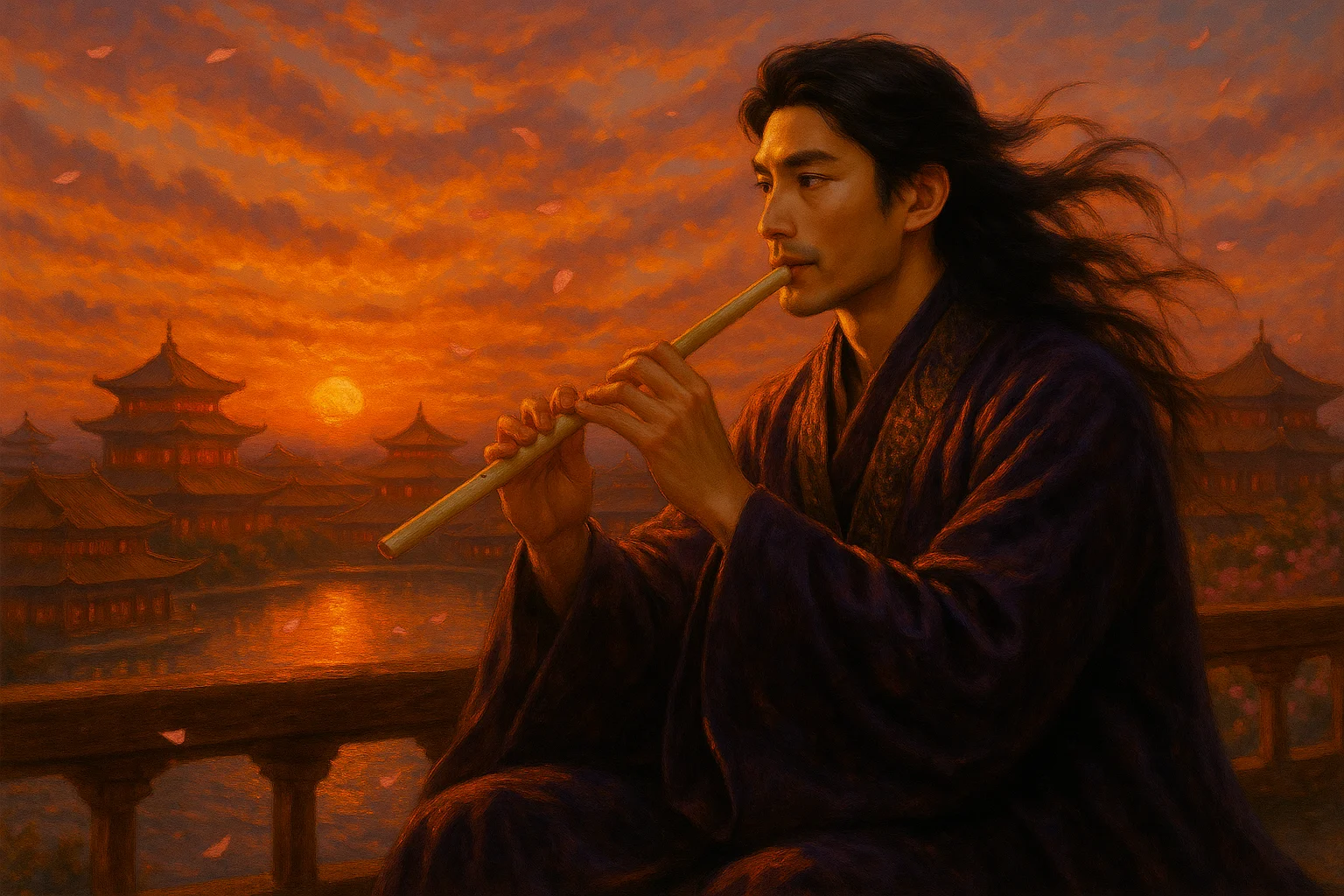Green willows and sweet grass shade the Pavilion of Farewell;
My gallant young man has left me alone, alas!
At fifth watch the bell breaks my dream in my room,
Midst flowers falling in showers of spring rain I pine for him.
The heartless can’t know the grief of the heartless.
One inch of love becomes thousands of threads.
However far the earth and sky may extend,
There’s no end to lovesickness without end.
Original Poem
「玉楼春 · 春恨」
晏殊
绿杨芳草长亭路。年少抛人容易去。
楼头残梦五更钟,花底离愁三月雨。
无情不似多情苦。一寸还成千万缕。
天涯地角有穷时,只有相思无尽处。
Interpretation
Though undated, this lyric exemplifies Yan Shu's mastery of persona poetry, adopting a jilted woman's voice to explore love's betrayal with rare emotional intensity. Departing from his usual restrained elegance, the work employs strategic hyperbole and metaphysical conceits to articulate love's cruel paradox—the more profound the affection, the more infinite the suffering.
First Stanza: 绿杨芳草长亭路。年少抛人容易去。楼头残梦五更钟,花底离愁三月雨。
Lǜ yáng fāng cǎo cháng tíng lù. Nián shào pāo rén róng yì qù. Lóu tóu cán mèng wǔ gēng zhōng, huā dǐ lí chóu sān yuè yǔ.
Willows and sweet grass line the farewell way—
Youth's darling left without delay.
In my tower, dawn bells shatter unfinished dreams,
Beneath blossoms, parting grief streams
With March's unceasing rains.
The stanza constructs parallel dimensions of abandonment: the horizontal plane of geographical departure (长亭路) contrasts with vertical axes of temporal suffering (五更钟) and emotional precipitation (三月雨). The "unfinished dreams" (残梦) symbolize interrupted intimacy, while the March rains' fertility ironically underscores romantic sterility.
Second Stanza: 无情不似多情苦。一寸还成千万缕。天涯地角有穷时,只有相思无尽处。
Wú qíng bù sì duō qíng kǔ. Yī cùn huán chéng qiān wàn lǚ. Tiān yá dì jiǎo yǒu qióng shí, zhǐ yǒu xiāng sī wú jìn chù.
Heartlessness never stings like love's cruel art—
One inch of gut unravels a thousand threads of heart.
Heaven's edge and earth's rim have their bounds,
While longing's frontier knows no grounds,
No maps,*
No ends,
No charts.
Here Yan Shu devises a cartography of emotion where the body's physical limits (一寸) generate infinite psychological extensions (千万缕). The cosmic measurements (天涯地角) serve merely to emphasize love's spatial transcendence. The stanza's final triple negation (No…No…No) performs the very boundlessness it describes, leaving the reader in longing's infinite expanse.
Holistic Appreciation
This lyric poem, voiced from a woman's perspective, pours out the sorrow of parting through layered depictions of spring scenery, dream sequences, emotional hyperbole, and philosophical analogies, progressively intensifying the theme of longing. The opening lines set the scene with "green willows and fragrant grass," symbols of spring's beauty that ironically underscore the pain of separation. The middle section weaves dreams and rain, intertwining time and emotion to create a wistful, hazy atmosphere. The latter part contrasts "heartlessness" with "deep affection," abstracting and deepening the sentiment until the final lines elevate it to a timeless sense of "endless longing." Though the language is simple, the emotion is profound; the structure flows naturally, blending feeling and reason into a work of exceptional aesthetic value.
Artistic Merits
This lyric poem masterfully adopts the persona of a boudoir-bound maiden to articulate the sorrow of separation. Its language flows with crystalline purity and heartfelt sincerity, achieving perfect fusion of scene and sentiment. Through vernal imagery like "willows verdant and grasses fragrant," it amplifies parting melancholy, while details such as "awakening to temple bells" and "spring rain beneath blossoms" intensify the atmospheric depth. The poet demonstrates particular virtuosity in employing metaphors and antitheses - "a single inch unraveling into countless strands" vividly depicts lovesickness's torment, while "the heartless never suffer like the tender-hearted" uses ironic contrast to lay bare the emotional agony of profound attachment. These techniques lend the poem an uncommonly moving profundity for Yan Shu's oeuvre, showcasing remarkable emotional intensity and artistic tension.
Insights
This lyric poem articulates the anguish of unrequited love through a feminine lens. While ostensibly lamenting "spring's parting sorrow," it ultimately meditates on life's transience and the fleeting nature of human affections. The depicted "agony of profound attachment" and "boundless yearning" transcend mere romantic expression, becoming poetic condensations of existential contemplation. In our fast-paced modern society, this steadfast devotion to authentic emotion retains profound resonance, serving as a poignant reminder to cherish present companions and treasure meaningful connections while they endure.
Poem Translator
Xu Yuanchong (许渊冲)
About the Poet

Yan Shu (晏殊 991 – 1055) Originaire de Fuzhou dans le Jiangxi, Yan Shu fut le maître fondateur de l'école wanyue (élégante et retenue) de la poésie ci sous les Song du Nord. Enfant prodige entré dans l'administration à quatorze ans, ses ci allient noblesse classique et méditation philosophique dissimulée sous des évocations de prospérité raffinée. Mentor de talents comme Fan Zhongyan et Ouyang Xiu, il initia l'École du Jiangxi en poésie ci et posa les bases de l'épuration du genre sous les Song.












